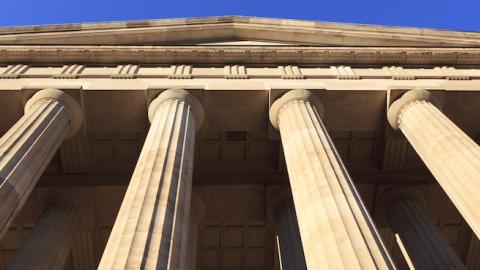To death and taxes add a new certainty: Starting next year we will watch the size of our government expand. We Americans, one-time disciples of the theory that that government is best which governs least, will have to choose in November between two paths to bigger government. The Democratic candidate has followed her party to the left for she is its leader. She is promising a host of new government programs, to be financed by trillions in new taxes over the next decades. Her cradle-to-grave plans begin with free—that is, taxpayer-paid—day care, progresses through subsidized college tuition and on to larger pensions for widows. The Republican candidate sees government as a huge resource to be expanded in ways that would back his negotiating skills, which he promises will make America great again. He does not feel bound by the checks and balances built into the system by our Founding Fathers, if indeed he is aware of them, and so would expand the use of executive power to such an extent that conservatives will feel they have lost control of the soul of the Republican party and are already making noises about finding a new political home. Barring an indictment of Hillary Clinton for her casual attitude towards the handling of national security matters, or some miracle move by the "No Trump" forces, these two survivors of their parties' primary battles will square off in November.
Although Clinton can't seem to attract white men to her cause, she is favored largely because Trump is believed to have antagonized women (although he won a majority of women's votes in the New York primary), blacks, Hispanics and others he has chosen to insult, as well as the conservative wing of his adopted party. Both have record-high unfavorability ratings, both face large numbers of party members who say they will not vote for their party's candidates because they preferred Bernie Sanders, in the case of Clinton, or any one of a number of his rivals, in the case of Trump.
From the point of view of those who happily cheered the end of the age of big government, the candidacies are much of a muchness. Big government has arisen from the grave, in rude good health. Clinton would increase the reach of government by expanding the welfare state and raising taxes. Trump would increase the size of the military, making it so powerful that we would never have to use it, and wield executive power in a way that would have the Founding Fathers whirling in their graves, and conservatives mourning the atrophy of the checks and balances those distinguished ancestors built into the American system of government.
There is also something of a similarity between Hillary and The Donald when it comes to trade policy.
* Both frown on companies departing the US for more favorable tax venues. Trump attacks that problem by calling for a halving of the corporate tax rate and a ban on imports from factories that fled America. Hillary would levy an exit tax on departing companies, and supports new regulations that makes so-called inversions more difficult.
* Both have abandoned free trade, as it is traditionally understood, in favor of a more protectionist stance. Both oppose the Trans-Pacific Partnership (TPP) agreement, in Trump's case because our negotiating team consists of incompetents who were outfoxed by wily foreigners, and in Hillary's case because she is not certain of the strength of protections for displaced workers, environmental regulations and other features that she discovered after initially labelling it "the gold standard of trade agreements".
There areas of agreement end. The candidates differ on how to cope with rising inequality. Clinton would raise taxes on top earners, producing $1.1-$2.1 trillion in new revenues in the next decade and twice that in the following ten years (assuming of course that the new taxes do not stifle growth and cut into the tax take, as they surely would), and spend the proceeds on programs that largely benefit lower-income families. The top 1 percent of American taxpayers pay almost half of all income taxes, the top 20 percent pay 84 percent, while the 45 percent of Americans who pay no income tax are major consumers of the sorts of benefits that Clinton would set in place or expand. If Stanford professor and former chairman of the President's Council of Economic Advisers Ed Lazear is right, this plan would "produce negative economic growth."
Trump would also redistribute income, but in the opposite direction: businesses and all taxpayers would get a tax cut, the wealthiest the largest of all, in both dollars and percentage terms. No sense in analyzing the plan: its effect on the federal deficit is so massive that no congress would risk its consequences in pursuit of the unsustainable growth it would initially produce.
On other economic issues the lines are more clearly drawn.
* Hillary would do all she can to end fracking and, indeed, the age of fossil fuels; Donald would protect the coal industry from the Environmental Protection Agency.
* Clinton, styling herself "a grandmother with two eyes and a brain" can see that global warming is the "most consequential, urgent challenge we face"; Trump says the idea was created by the Chinese to make our industries non-competitive.
* She denies that immigration adversely affects middle class workers, a position belied by recent scholarship; he would build a wall to keep out illegal immigrants, the design for which might find a market in the EU these days as it copes with a flood of largely Muslim immigrants.
This will be a contest between two disliked candidates, with Trump hated by women more than Hillary is hated by men. Hillary will be relying on the Obama coalition of blacks, unmarried women, Hispanics and trade unions. Trump has little support in the Republican establishment, and must rely on getting supporters of his "movement" to the polls, many for the first time. Right now, Clinton leads Trump in most polls, just as she led Obama in the 2008 primary season, and as Jeb Bush led Trump this time around, before he became one of the sixteen rivals Trump disposed of in the primaries. Favorable polls notwithstanding, Hillary cannot be certain that she can deny Donald the pleasure of re-doing the White House in his signature 24K gold and marble, in the manner of Louis XIV.
















